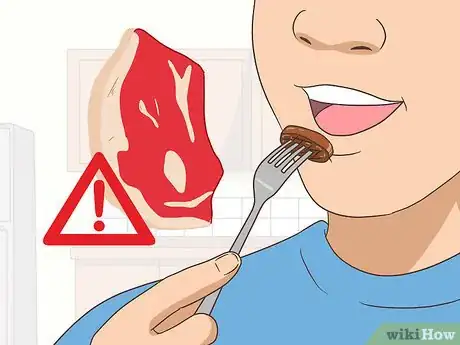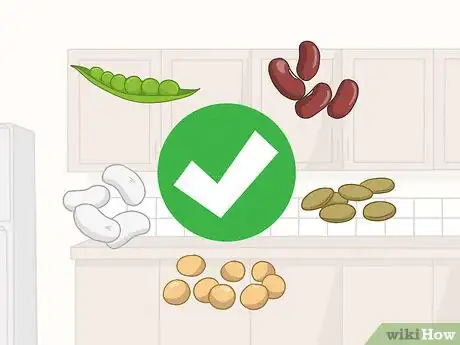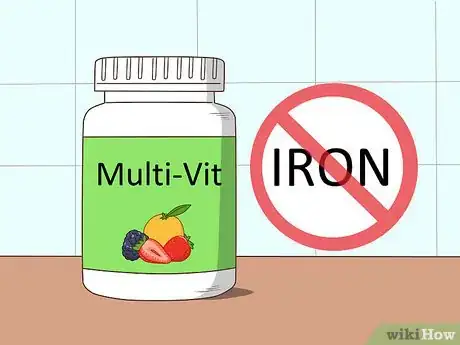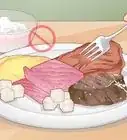This article was co-authored by Kristi Acuna and by wikiHow staff writer, Jennifer Mueller, JD. Kristi Acuna is a Holistic Nutritionist and the Owner of Holistic Nutrition Center in Orange County, California. With over 15 years of experience, Kristi specializes in a comprehensive and holistic approach to nutrition through nutrition response testing, heart rate variability, thermography, and brainspan. She has experience helping with weight gain, fatigue, insomnia, food allergies, diabetes, irritable bowel syndrome, digestion problems, sinus infections, and PMS and menopause symptoms. Kristi holds a BS in Holistic Nutrition from Clayton College of Natural Health. Holistic Nutrition Center focuses on the root cause of health challenges and helps people heal and restore balance to their bodies.
There are 13 references cited in this article, which can be found at the bottom of the page.
This article has been viewed 162,754 times.
Ferritin is a protein your body makes to store iron for later use. For women, the normal range of ferritin in your blood is 11 to 307 nanograms per milliliter. For men, the normal range is 24 to 336 nanograms per milliliter. Higher than normal levels may indicate a number of diseases or conditions, including liver disease and hyperthyroidism.[1] However, there are lifestyle changes you can make that can reduce or eliminate the need to give blood on a regular basis.
Steps
Adjusting Your Diet
-
1Limit your consumption of red meat. Red meat has high concentrations of heme iron, iron from animal sources, which is more readily absorbed by the body. Absorption of heme iron also increases your body's absorption of non-heme iron (iron from plant-based foods). If you do choose to eat red meat, look for lower iron sources like ground beef and cheap cuts.[2]
- If you do eat red meat, avoid eating it with foods that contain vitamin C and beta-carotene, which enhance iron absorption. A hearty beef stew with potatoes and carrots is not a good idea if you're looking to reduce your ferritin levels.
- In addition to red meats, be conscious of the iron levels in the fish you eat. Some fish, such as tuna and mackerel, have higher iron levels.
-
2Eat plenty of beans and legumes. Beans and legumes are high in phytates, a micronutrient that inhibits the absorption of iron. Whole grains and seeds also have phytates. Soaking or sprouting your beans before consumption will reduce the phytate levels.[3]
- Oxalates, present in many dark, leafy greens such as spinach, also inhibit iron absorption. However, greens such as spinach that have high levels of oxalates also have high levels of iron.[4]
Advertisement -
3Choose whole grain over white bread. Whole-grain bread has higher phytate concentrations than bread made with refined white flour. However, whole grains also contain more minerals, so check the iron content of any bread you buy.[5]
- Leavened bread has lower levels of phytates than unleavened bread.
-
4Have a glass of milk after meals. Calcium inhibits iron absorption, which can reduce the complications of the excess iron already present in your body. In addition to milk, you might also try yogurt or hard cheese.[6]
- If you're lactose-intolerant, drink mineral water infused with calcium during and after meals.
-
5Drink green tea. Green tea contains powerful antioxidants that bind to iron and prevent its absorption. Particularly if you plan to eat an iron-rich meal, drinking a cup of green tea while you eat can lessen the effects on your ferritin levels.[7]
- Coffee also inhibits iron absorption, if you're not a fan of tea.[8]
-
6Snack on nuts and seeds. Nuts and seeds, including walnuts, almonds, peanuts, and hazelnuts, inhibit your body's absorption of iron. In addition to a handful of nuts as a snack, you can add nuts to casseroles or put nut butters on sandwiches.[9]
- While coconut contains the same inhibitors, they are found in lower concentrations and don't have a significant effect on your body's iron absorption.
-
7Avoid nutritional supplements that contain iron. If you regularly take a multi-vitamin or other supplement, check the label carefully to make sure it does not include iron. The iron included in supplements is formulated to be especially easy for your body to absorb.[10]
- Iron-fortified food, such as bread, is also common. Check the nutritional labels on any food you buy and avoid anything with added iron.
-
8Reduce alcohol intake significantly. Excessive amounts of alcohol combined with excessive iron can cause extensive damage to your liver. Higher than normal ferritin levels have been linked to alcohol abuse, and may be an early sign of liver disease.[11]
- If you do drink alcohol, stick to red wine. It has micronutrients that inhibit iron absorption.[12]
Getting Regular Exercise
-
1Start a walking regimen. Particularly if you are not particularly active, walking can be a good way to get your body moving and build your overall physical strength. Gradually increase your speed as well as the distance or length of time you walk.[13]
- Aim to walk at least 30 minutes a day every day, in addition to other physical activities. Escalating your walking to running can cause a greater reduction in ferritin levels.
- Warm up your body before any exercise, including something as low-impact as walking. Gentle, dynamic stretching before walking will help prepare your body.
-
2Add resistance training. Working out with weights not only increases your overall muscle strength, new research suggests that it can reduce your ferritin levels. Try doing at least 40 minutes of strength training 3 times a week, along with your regular exercise routine.[14]
- You may want to start with resistance training if you have a hard time with aerobic exercises, such as walking or running.
- If you're new to weight training, you might want to start out with a trainer or experienced lifter so they can check your form and make sure you have proper form and that you're using equipment correctly.
-
3Increase the intensity and duration of your exercise. Intense exercise has the greatest effect on ferritin levels. This means going beyond regular, moderate exercise. To decrease ferritin levels, you need to engage in intense, prolonged training. Talk to your doctor about what types of training may be right for you, and to get recommendations for programs or professionals in your area that can help get you started.[15]
- If you don't have a lot of time to exercise, interval training can be a good way to increase the intensity of your workouts. High-intensity interval training can burn a significant amount of calories in a short period of time, as well as potentially reducing your ferritin levels.
- Athletes with normal ferritin levels have a high likelihood of developing an iron deficiency as a result of intense training.
-
4Have patience. If you've just started an exercise regimen, it may take months or even years before it starts to affect your ferritin levels to any significant degree. Gradually increase the intensity of your exercise, and continue to check your ferritin levels regularly.[16]
- If you want to reduce your ferritin levels, exercise alone typically isn't going to do it for you. Make dietary changes as well, and consume less iron.
Expert Q&A
Did you know you can get expert answers for this article?
Unlock expert answers by supporting wikiHow
-
QuestionWhat should I do if my ferritin level is high?
 Kristi AcunaKristi Acuna is a Holistic Nutritionist and the Owner of Holistic Nutrition Center in Orange County, California. With over 15 years of experience, Kristi specializes in a comprehensive and holistic approach to nutrition through nutrition response testing, heart rate variability, thermography, and brainspan. She has experience helping with weight gain, fatigue, insomnia, food allergies, diabetes, irritable bowel syndrome, digestion problems, sinus infections, and PMS and menopause symptoms. Kristi holds a BS in Holistic Nutrition from Clayton College of Natural Health. Holistic Nutrition Center focuses on the root cause of health challenges and helps people heal and restore balance to their bodies.
Kristi AcunaKristi Acuna is a Holistic Nutritionist and the Owner of Holistic Nutrition Center in Orange County, California. With over 15 years of experience, Kristi specializes in a comprehensive and holistic approach to nutrition through nutrition response testing, heart rate variability, thermography, and brainspan. She has experience helping with weight gain, fatigue, insomnia, food allergies, diabetes, irritable bowel syndrome, digestion problems, sinus infections, and PMS and menopause symptoms. Kristi holds a BS in Holistic Nutrition from Clayton College of Natural Health. Holistic Nutrition Center focuses on the root cause of health challenges and helps people heal and restore balance to their bodies.
Holistic Nutritionist
-
QuestionWhat causes high ferritin levels?
 Kristi AcunaKristi Acuna is a Holistic Nutritionist and the Owner of Holistic Nutrition Center in Orange County, California. With over 15 years of experience, Kristi specializes in a comprehensive and holistic approach to nutrition through nutrition response testing, heart rate variability, thermography, and brainspan. She has experience helping with weight gain, fatigue, insomnia, food allergies, diabetes, irritable bowel syndrome, digestion problems, sinus infections, and PMS and menopause symptoms. Kristi holds a BS in Holistic Nutrition from Clayton College of Natural Health. Holistic Nutrition Center focuses on the root cause of health challenges and helps people heal and restore balance to their bodies.
Kristi AcunaKristi Acuna is a Holistic Nutritionist and the Owner of Holistic Nutrition Center in Orange County, California. With over 15 years of experience, Kristi specializes in a comprehensive and holistic approach to nutrition through nutrition response testing, heart rate variability, thermography, and brainspan. She has experience helping with weight gain, fatigue, insomnia, food allergies, diabetes, irritable bowel syndrome, digestion problems, sinus infections, and PMS and menopause symptoms. Kristi holds a BS in Holistic Nutrition from Clayton College of Natural Health. Holistic Nutrition Center focuses on the root cause of health challenges and helps people heal and restore balance to their bodies.
Holistic Nutritionist
Warnings
- Consult with your doctor before beginning any new exercise regimen. Have your ferritin levels tested regularly to evaluate your body's response to training and adjust as necessary.⧼thumbs_response⧽
- Milk thistle is a commonly recommended supplement for treating excessive iron. However, depending on the reason for your high ferritin levels, milk thistle may actually exacerbate the problem.[18] Talk to your doctor before starting any herbal supplements, including milk thistle.⧼thumbs_response⧽
References
- ↑ https://www.mayoclinic.org/tests-procedures/ferritin-test/about/pac-20384928
- ↑ https://www.marksdailyapple.com/should-you-reduce-your-iron-intake/
- ↑ https://besynchro.com/blogs/blog/13531957-oxalates-phytates-and-saponins-the-secret-anti-nutrients-antinutrients-in-healthy-foods
- ↑ http://www.berkeleywellness.com/healthy-eating/nutrition/article/vegetables-grains-and-mineral-absorption
- ↑ http://www.berkeleywellness.com/healthy-eating/nutrition/article/vegetables-grains-and-mineral-absorption
- ↑ https://www.marksdailyapple.com/should-you-reduce-your-iron-intake/
- ↑ http://news.psu.edu/story/396431/2016/03/08/research/green-tea-and-iron-bad-combination
- ↑ https://www.marksdailyapple.com/should-you-reduce-your-iron-intake/
- ↑ https://www.ncbi.nlm.nih.gov/pubmed/3341259
- ↑ http://www.home-remedies-for-you.com/askquestion/24840/natural-way-to-lower-ferritin-level-in-blood.html
- ↑ https://www.mayoclinic.org/tests-procedures/ferritin-test/about/pac-20384928
- ↑ https://www.marksdailyapple.com/should-you-reduce-your-iron-intake/
- ↑ http://ijp.tums.pub/en/articles/3869.html
- ↑ https://www.sciencedaily.com/releases/2015/07/150727093349.htm
- ↑ https://www.researchgate.net/publication/21613774_Exercise_and_Iron_Status
- ↑ https://www.researchgate.net/publication/233990675_The_effect_of_aerobic_exercise_on_serum_ferritin_levels_in_untrained_middle-aged_women
- ↑ Kristi Acuna. Holistic Nutritionist. Expert Interview. 17 September 2020.
- ↑ https://www.ncbi.nlm.nih.gov/pmc/articles/PMC2231430/
About This Article
Ferritin is a protein your body makes to store iron, and you can reduce your ferritin levels through simple changes to your diet and exercise regimen. Try to eat less red meat, since it's high in iron. Instead, eat plenty of beans, lentils, whole grains, and nuts. You can also drink a glass of milk or eat a yogurt after your meals. The calcium in the dairy will will slow down iron absorption in your body. If you don’t eat dairy, you can drink green tea instead for the same effect. It’s also important to work out a few times a week. If going to the gym isn’t your thing, you can swim, join a dance or martial arts class, or even just go for a walk. For more tips from our Medical co-author, including how to incorporate more nuts into your meals, read on!



































































Medical Disclaimer
The content of this article is not intended to be a substitute for professional medical advice, examination, diagnosis, or treatment. You should always contact your doctor or other qualified healthcare professional before starting, changing, or stopping any kind of health treatment.
Read More...